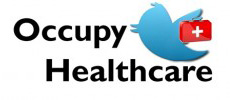In our attempts to encourage people to lead healthier lives, we often make the mistake of bombarding them with facts and stats, do’s and don’ts, assuming the problem is a lack of knowledge. But let’s be honest – most people know that French fries are not the healthiest food in the world, fruits and vegetables are good for you, and that you really ought to exercise regularly.
So, what’s the problem? One aspect of the problem is of course the systems level issues of food access, cost, time and space to be active, etc. that we have mentioned before.
Another aspect though is one of attitude and culture.
Feel Rich, which launched in December, is attempting to address just this (sidenote: the organization’s CEO and others involved were on a SXSW Panel just this past weekend).
Feel Rich’s goal is the creation of a health and fitness culture born from the urban and hip-hop community’s love and respect for music, movement, and entertainment. Their message: health is the new wealth.
As opposed to your typical public health campaign centered on facts, stats, and do’s and don’ts, Feel Rich is attempting to first foster a desire for health (in other words, crafting an attitude and creating a culture that sees health as critical and desirable as wealth), engaging urban youth in a meaningful way that speaks to their interests. In Feel Rich’s own words – “It’s health on your terms, fitness in your style, and food choices that make sense on the streets where you live.” It’s also about making health and wellness cool.
I think it’s an exciting and inspiring approach, and the way the Feel Rich movement taps into attitudes (not just information), reminds me of the baby carrots campaign I’ve written about before. After all, whether we’re talking about the junk food industry, big tobacco, or pretty much any other product we see commercials for, appealing to emotion and attitudes is the way advertising is done. It’s long past due that prevention and health promotion advocates started utilizing this powerful strategy.
Feel Rich ties this powerful appeal to attitude and culture with empowering information on food, fitness, and health, and an array of videos and stories to engage and inspire their audience. And with over 3 million YouTube views, it looks like they are doing just that.
I’ll close with some food for thought on this topic from David Katz’s most recent Huffington Post article:
“What if health were more like wealth?
- If health were like wealth, we would value it while gaining it — not just after we’d lost it.
- If health were like wealth, we would make getting to it a priority.
- If health were like wealth, we would invest in it to secure a better future.
- If health were like wealth, we would work hard to make sure we could pass it on to our children.
- If health were like wealth, we would accept that it may take extra time and effort today, but that’s worth it because of the return on that investment tomorrow.
- If health were like wealth, society would respect those who are experts at it.
- If health were like wealth, young people would aspire to it.”
